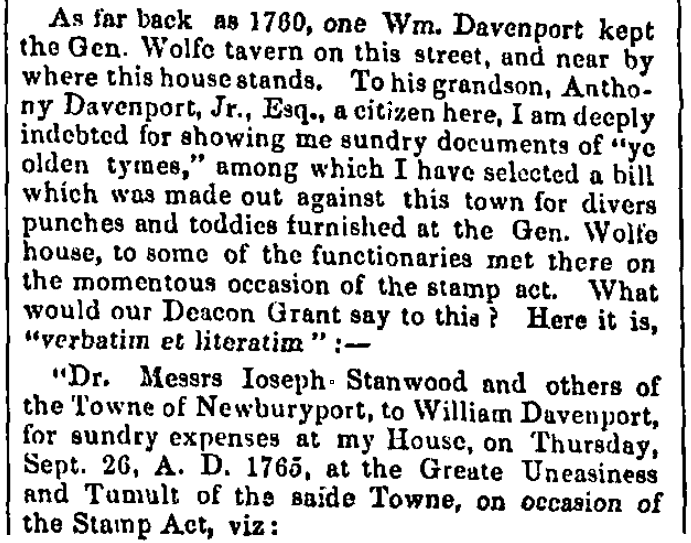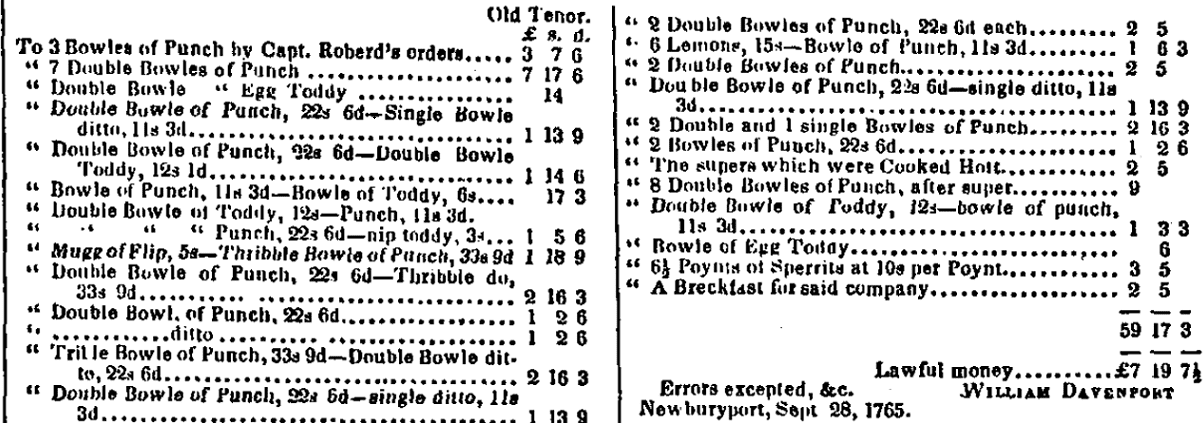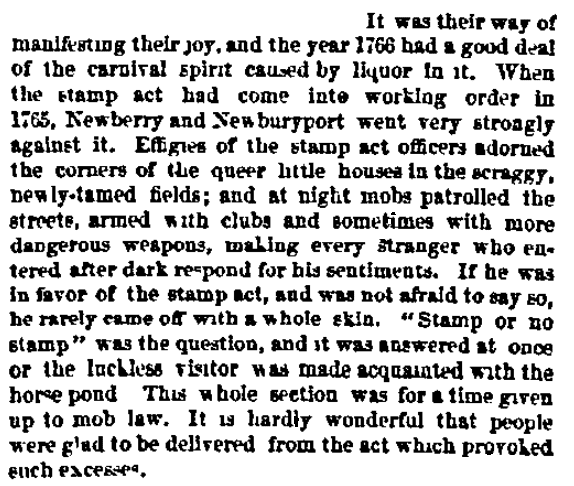Introduction: In this article, Melissa Davenport Berry writes about a riotous night of drinking in September 1765 while protesting the Stamp Act. The “meeting” was held in the Wolfe Tavern in Newburyport, Massachusetts – owned by the author’s 6th great grandfather. Melissa is a genealogist who has a website, americana-archives.com, and a Facebook group, New England Family Genealogy and History.
Author’s Note: A bar bill from September 1765 in the town of Newburyport, Massachusetts, reveals a potent protest over the Stamp Act that overshadowed even Beantown’s August 14 revolt. The buzz that surfaced in a local tavern stamped out all other uprisings and the bar bill is still around to prove it!
The British parliament passed a Stamp Act on the American colonies on 22 March 1765 that created a hotbed of conflict in the colonies, especially Massachusetts. The act mandated that many printed materials in the colonies had to be produced on special stamped paper from London that cost extra – including newspapers, magazines, and even playing cards. The cry of “No taxation without representation” was heard throughout the colonies.
The atmosphere was the same in every town; riots sprang up all over. Protesters feared that the act would drain money from the colonies and “Our Commerce would Stagnate and our Laborers Starve.” The Sons of Liberty were bent on preventing allegiance to a law that was contrary to the British constitution, certain laws of God, and the common rights of mankind.
According to sources, the Rev. Nathaniel Appleton said the “uneasiness” was universal. “All as one man rising up in opposition to it, such a union, as was never before witnessed in all the colonies.”

On 26 September 1765, men were summoned to a meeting at Wolfe Tavern, owned by Captain William Davenport, to commiserate over the unfairness of the Stamp Act. The gathering was nothing new, as the sturdy patriarchs had sat many a night around the fire in Davenport’s parlor nursing their toddies while rocking the cradle of liberty. A tavern had the proper ingredients to ease the “Greate Uneasiness and Tumult of the saide Towne, on occasion of the Stamp Act.”
Years after that meeting, Anthony Davenport Jr., grandson of the Wolfe owner William Davenport, shared the bar bill and “sundry documents of ye olden tymes” with a correspondent, and it appeared in the Boston Statesman.

The details of that bar bill are astonishing, and show that the Sons of Liberty stayed up all night complaining about the Stamp Act and consuming vast quantities of alcohol.

When William Davenport tallied up the bar tab, he must have held his breath as he handed over a bill for 59 pounds, 17 shillings and three pence. This list included morning brew and vittles consumed after the all-night bender. A very amusing article published in Harper’s Magazine in 1876 estimated that at that meeting, a gallon of punch was consumed by each partaker – who kept his spirits up by pouring spirits down! The “uneasiness” now haunted Davenport as he attempted to collect – 85 percent was put on credit – 11 pounds from Captain Robud, Richard Farrow and one Celeby (Colby).
According to the Boston Journal “a deluge in drunkenness” crept over Newburyport and her surrounding areas, with the residents “manifesting their joy” and “a good deal of carnival spirit caused by liquor” directly due to the Stamp Act riots. There was drinking at the meetings, the many protests and demonstrations, and the mobs that roamed the streets at night looking for supporters of the Stamp Act.

The protests did the trick: the Stamp Act was repealed on 18 March 1766, less than a year after it had been approved.
And what about the bar bill at the Wolfe Tavern? In 1768 Davenport, on his last nerve, appealed to officials at a town meeting – and they voted that he should receive six pounds and six shillings compensation (Newburyport Town Records, Vol. 1 125). While the Wolfe would see many more nights of high spirits and even higher bar tabs, like the Independent Military Society’s 45-toast finish in 1774 (Essex Journal 21 Town records), there will never be another night like the Stamp Act meeting!
Note: An online collection of newspapers, such as GenealogyBank’s Historical Newspaper Archives, is not only a great way to learn about the lives of your ancestors – the old newspaper articles also help you understand American history and the times your ancestors lived in, and the news they talked about and read in their local papers. Have you traced any of your ancestors back to colonial America? Please share your stories with us in the comments section.
Explore over 330 years of newspapers and historical records in GenealogyBank. Discover your family story! Start a 7-Day Free Trial
Further Reading:
- Coffin, Joshua. “A Sketch of History of Newbury, Newburyport, and West Newbury.”

A great article that brought a smile.
Hi Jim. Thanks and glad to hear that! I know the Davenports are part of your family tree too.
This is a scream! After we get past the election, I’m hoping to write more humorous columns for the Newburyport Daily News, and this is irresistible fodder for a whimsical piece on bar tabs, then and now. Will direct readers to your blog article. (BTW: I recall my dad & uncle talking about the Wolfe Tavern, an ancestor likely between 1875 and 1900, last name Creeden, somehow connected to it.)
Thanks Jack! Yes, the Wolfe will forever be a topic of conversation and add to the Port’s colorful history! Lots of drama and scandal went down there I found many tidbits on Genealogybank! I will look up the Creeden connection and get back at ya!
I found many tidbits on Genealogybank! I will look up the Creeden connection and get back at ya!  Stay safe.
Stay safe.
I wonder if my ancestor Eleazer Johnson and his sons were there. They were ship builders and definitely against the Stamp Act.
Thanks for sharing Fran! I actually will be covering more on the Wolfe Tavern. I believe Johnson was burning tea on boats before the actual, big tea party. So stay tuned! Also I have a document with some of his relatives — And the meeting of the Washington Light Infantry in Newburyport — Captain Nicolas Johnson, Ensign Samuel Brown and Lt. Eleazer Johnson were chosen officers. I found an article on GenealogyBank with the details.
Melissa, thanks so much for taking the time to prepare and post your article. The words “Outrageous Bar Bill” in connection to “Stamp Act” were indeed a hook that drew me into a thorough reading. This made the Stamp Act come alive, somewhat akin to visiting and investigating the Gettysburg battlefield after having studied the period’s history in high school many years ago. I’d not known of the depth and widespreadness of the sentiments against the Stamp Act. Thanks again. — Louie in Odenton MD
Thanks so much for the share, Louis Larson! I appreciate it! The American Revolution is full of heated emotions and I am finding some great articles on GenealogyBank. Stay tuned I will have more drama, scandal, and fiery characters.
Just to put things into perspective:
The bill:
If you want to compare the value of a £59 17s 3d Commodity in 1765 there are four choices. In 2019 the relative:
real price of that commodity is £8,243.00
labour value of that commodity is £112,000.00
income value of that commodity is £131,500.00
economic share of that commodity is £1,051,000.00
Amount collected that night:
If you want to compare the value of a £7 19s 7d Commodity in 1765 there are four choices. In 2019 the relative:
real price of that commodity is £1,099.00
labour value of that commodity is £14,930.00
income value of that commodity is £17,530.00
economic share of that commodity is £140,100.00
Recouped from town:
If you want to compare the value of a £6 6s 0d Commodity in 1765 there are four choices. In 2019 the relative:
real price of that commodity is £867.50
labour value of that commodity is £11,790.00
income value of that commodity is £13,840.00
economic share of that commodity is £110,600.00
Still outstanding:
If you want to compare the value of a £45 11s 8d Commodity in 1765 there are four choices. In 2019 the relative:
real price of that commodity is £6,277.00
labour value of that commodity is £85,300.00
income value of that commodity is £100,100.00
economic share of that commodity is £800,500.00
https://www.measuringworth.com/calculators/ukcompare/
Wow, Rob. Thanks for the lowdown! Those boys consumed some juice! No wonder Davenport hit them up for funds at the town meeting!